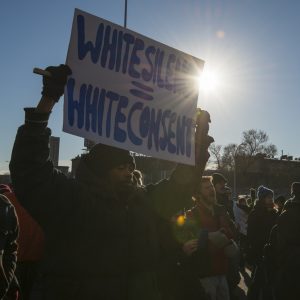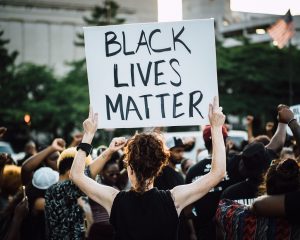By Anna Miller, a staff writer at RightsViews and a graduate student in ISHR’s Human Rights MA Program.
Note: this piece addresses antisemitism in the United States only, though it exists worldwide. As a Jewish person born and living in the United States, my knowledge is primarily based in this country.
The Jewish people are no stranger to hatred and violence. Jewish history is marked by thousands of years of antisemitism, centuries of forced diaspora, and a boiling point of bigotry that led to the Holocaust. Today, antisemitic hate crimes and speech have reached a new high in the United States. In 2019, the Anti-Defamation League reported 2,107 antisemitic incidents, the highest number on record since ADL began tracking such incidents in 1979 (ADL).
Due to their acute familiarity with discrimination and injustice, Jews tend to be active in social justice movements and speak up about human rights issues. Notably, Jews marched in civil rights protests in the 1960s and were vocal about women’s rights in the 1970s (PBS). Yet this past summer – during a new peak of violence against Black people – Jews were surprisingly quiet. Many of us posted our #BlackoutTuesday pictures on Instagram and then silently walked away.
Tensions between the Black and Jewish communities in the United States are not new. While many Black and Jewish communities live and work together cooperatively, there is a history of antisemitism in the Black community and racism in the Jewish community. In the latter half of the 20th century, Jews were quick to assimilate to American culture and American whiteness. Power could not be found in having a Jewish identity, but it could be found in adopting a white identity. Many Jews shed the skin of the “oppressed minority” and entered a world of upward mobility and newfound whiteness. This is not to say that Jews were not still targeted and discriminated against – they absolutely were. Many Jews were simply able to identify themselves as white on documents like loans, mortgages, housing agreements, and employee forms and this gave them an elevated status in the United States.
Today, some old resentments remain and new ones have been born. In the last few years, a number of Jews have refused to support Black Lives Matter efforts fearing that the movement itself was anti-Israel and thus antisemitic. First, it is important to distinguish between two key organizations working for the rights of Black people. The Black Lives Matter Global Network Foundation is the organization most people are familiar with, founded in 2013 after the murder of Trayvon Martin. This organization has not published any formal condemnation of Israel. The Movement for Black Lives (M4BL) was founded in 2014 and has shared pro-Palestine (often interpreted as anti-Israel) resources on their platform in the past.
In 2016, M4BL released a new policy document aimed at creating a better future for Black people. M4BL claimed that this document represented the views of 25+ groups engaged in Black Lives Matter efforts, including two prominent groups known for activism in support of Black lives and against gun violence Black Youth Project 100 and Brighter Days for Justice (formerly known as Million Hoodies Movement for Justice). The document included 40 policy suggestions – one being a suspension of United States military aid to Israel. While that exact document can no longer be found on the M4BL website, you can access their vision for military expenditures and reallocations here. It is critical to understand that M4BL is condemning specific, inhumane military activity in Israel and not Jewish people as a whole. Further, not every Black Lives Matter organization – or Black person – holds these same views about Israel.
As such, there is no good – or logical – cause for Jewish people to turn our backs on the systemic suffering of Black people. American Jews are traitors to our own cause if we abandon the most persecuted group in our country. Remember, we will not create a future free of antisemitism without also eradicating the other deeply ingrained bigotries present in the United States. We cannot simply take tweezers and pluck out the throbbing thread of antisemitism, while at the same time continuing to oppress other minority groups in the United States.
I invite Jews and Jewish organizations to join me in considering how we are complicit in systems of privilege in the United States. According to the Brandeis University American Jewish Population Project, 88.7% of American Jews are white non-Hispanic (Brandeis University). Many of us were born into white privilege – a hierarchy that will only lead to our downfall. The time may quickly come again that Jews are not white enough for our nation and our government. In the words of Jews for Racial and Economic Justice: “As long as white Jews remain tacitly invested in white supremacy—though it may benefit them in the short term—they leave in place the ideological roots necessary for the re-emergence of violent antisemitism in the future.”
Jewish people and organizations need to speak up about racism and inequality in the United States. If you are interested in learning more about what Jewish people can do to support black lives, visit Jews for Racial and Economic Justice, follow @jews4blacklives on Instagram, and take the time to better understand why many Jews see supporting Black lives as key to our culture and faith (perhaps start with this statement from the Jewish History Museum).
Photo Credits:
“Black Lives Matter protest” by Fibonacci Blue is licensed under CC BY 2.0
“Black Lives Matter” by seikoesquepayne is licensed under CC BY 2.0



When members of an historically oppressed group are co-opted, they become shielded and detached and no longer see themselves as persecuted. Yet as Ms. Miller points out, this is only a temporary makeshift sanctuary around which the fires of oppression rage and which will engulf it sooner rather than later. It is the moral imperative and politically expedient to rise above tribalism and seek common ground and the common good. This paradigm shift in thinking can only be accomplished by cultivating dialogue in education such that people don’t refer to their ideological talking points but address each other’s concerns and fears.